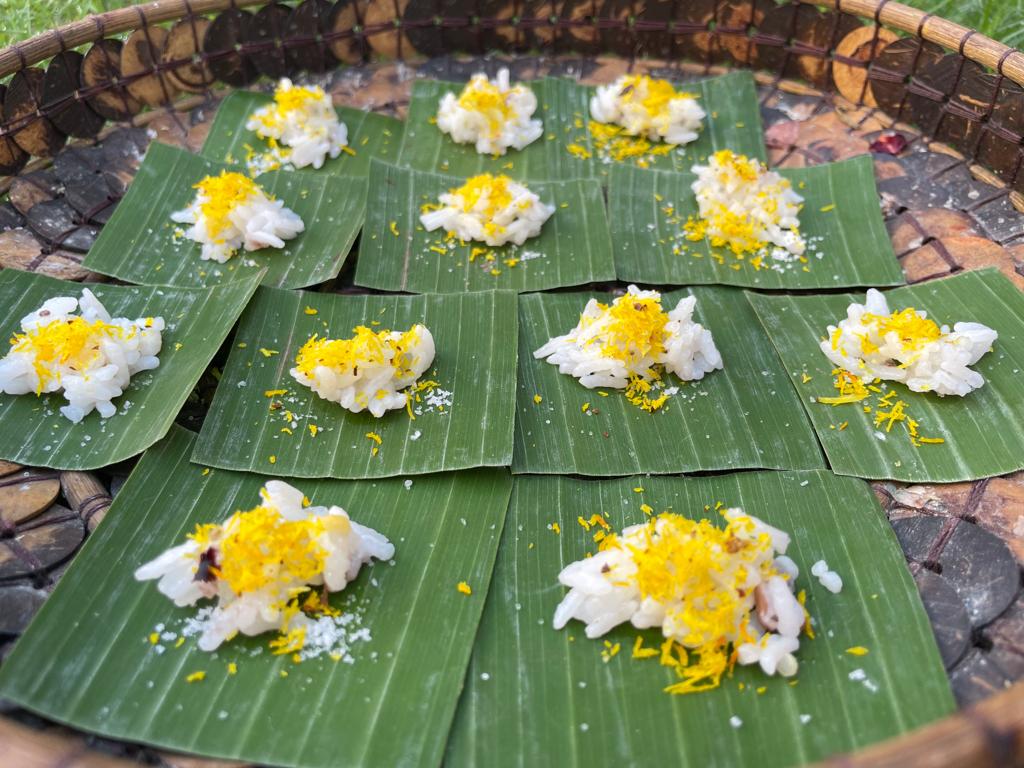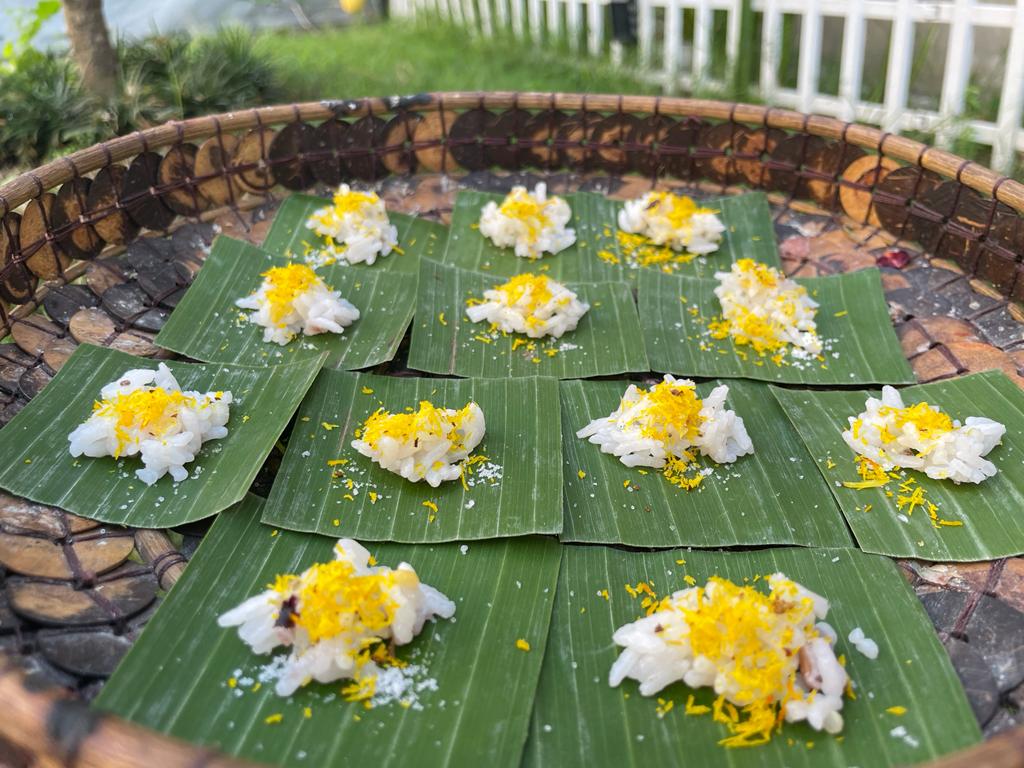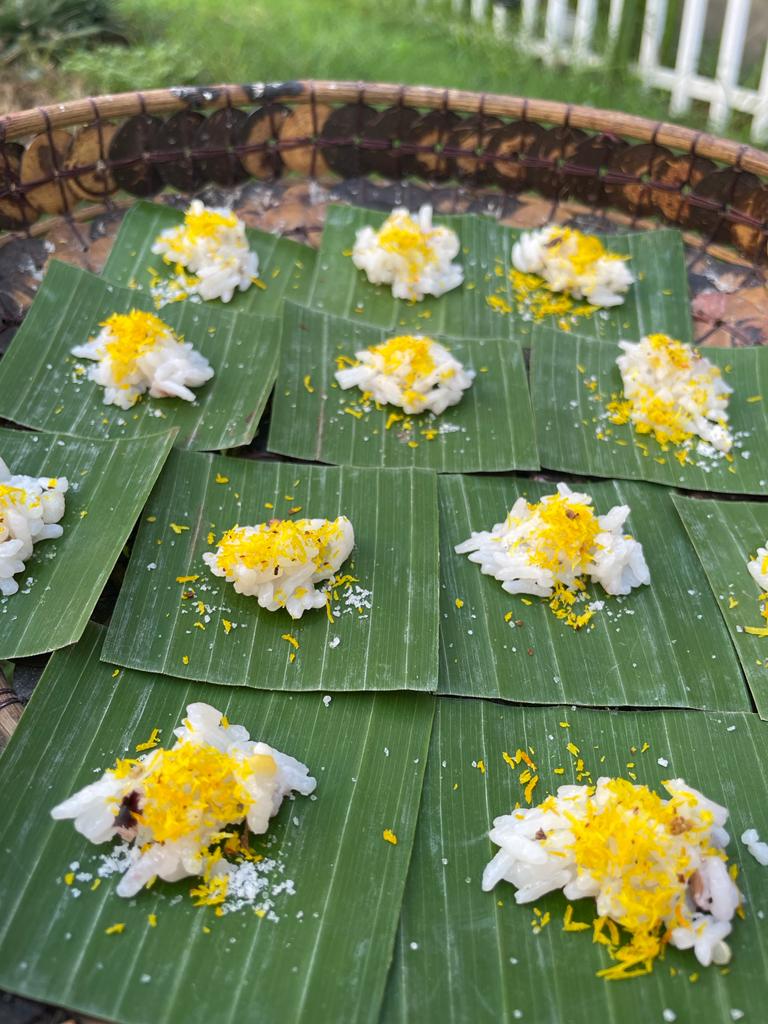Mebanten Saiban, also known as Ngejot, is a Hindu tradition in Bali practiced daily after morning cooking. Mesaiban or Mejotan, also referred to as Yadnya Sesa, is the simplest form of yadnya (sacrificial offering).
It represents the realization of Panca Yadnya, the five-fold offering that Hindu devotees incorporate into their daily lives.
Mesaiban, or Mejotan, is typically performed after cooking or before enjoying a meal. It is recommended to carry out mesaiban before eating. As stated in the Bhagavad Gita (Chapter 3, Verse 13):
YAJNA SISHTASINAH SANTO, MUCHYANTE SARVA KILBISHAIH, BHUNJATE TE TV AGHAM PAPA, YE PACHANTY ATMA KARANAT
Translation: The virtuous who partake of food that is offered in sacrifice are released from all sins. But those who prepare food for their own enjoyment, verily eat only sin.
The Meaning and Purpose of Mesaiban
Mesaiban, also known as Yadnya Sesa, embodies key ethical teachings in Hinduism, emphasizing selflessness and prioritizing the well-being of others. This practice encourages individuals to rise above personal interests and focus on the greater good.
Mesaiban signifies the importance of offering food as a form of gratitude after cooking, acknowledging that food is a vital source of life.
The purpose of mesaiban is to express gratitude for the blessings bestowed by Hyang Widhi (the Supreme God). Yadnya serves as a means to connect with Sang Hyang Widhi Wasa to attain spiritual purity.
This connection extends not only to the divine but also to its manifestations and all of creation, including nature and its inhabitants. Mesaiban reminds us of our interconnectedness with the divine and the world around us, fostering a sense of gratitude and harmony.
Facilities and how to made for Banten Saiban
Banten Saiban is a simple offering, and as such, the tools used are modest. It is typically presented using banana leaves filled with rice, salt, and side dishes prepared for the day, without any specific requirements for particular dishes.
The ideal Yadnya Sesa (Mesaiban) involves offering the Banten Saiban, sprinkling it with clean water, and lighting incense as a witness to the offering. However, a simpler version can be performed without sprinkling water or lighting incense, as the essence of Yadnya Sesa lies in its simplicity.
Places for Offering Saiban
There are five important places where Yadnya Sesa (Mesaiban) is offered, symbolizing the Panca Maha Bhuta (Five Great Elements):
- Pertiwi (Earth): Usually placed at the house’s exit or the entrance gate.
- Apah (Water): Placed near a well or water source.
- Teja (Fire): Positioned in the kitchen, on the cooking stove or hearth.
- Bayu (Air): Placed near rice or food.
- Akasa (Space): Positioned at the place of worship, such as shrines or altars.
According to the Manawa Dharmasastra, the locations for performing saiban include the Sanggah Pamerajan (family temple), kitchen, water dispenser in the kitchen, grinding stone, mortar and pestle, and broom
The last five places are where families perform Himsa Karma daily, as they unintentionally cause harm to animals and plants in those areas.
According to the Manawa Dharma Sastra Adhyaya III, verses 69 and 75, the sins incurred during meal preparation can be atoned for by performing Nyadnya Sesa.
The prayers for Yadnya Sesa (Mesaiban Prayer) dedicated to Hyang Widhi through Istadewata (including water, kitchen tools, rice containers, and shrines/altars) are as follows:
OM ATMA TAT TWATMA SUDHAMAM SWAHA, SWASTI SWASTI SARWA DEWA SUKHA PRADHANA YA NAMAH SWAHA.
Meaning: Om Hyang Widhi, as the supreme soul, may all your divine creations be happy.
Yadnya Sesa dedicated to the symbolic representations of Hyang Widhi known as bhuta, placed on the pertiwi/earth, has the following prayer:
OM ATMA TAT TWATMA SUDHAMAM SWAHA, SWASTI SWASTI SARWA BHUTA, KALA, DURGHA SUKHA PRADANA YA NAMAH SWAHA.
Meaning: Om Sang Hyang Widhi, You are the supreme soul, may all your creations in the form of bhuta, kala, and durgha be happy.
The Balinese Hindu tradition of mesaiban or mejotan involves offering or dedicating the food prepared for breakfast to God and His manifestations before consuming the meal ourselves. This practice is a way to express gratitude to God and seek redemption for any unintentional harm caused to animals and plants that become our food.


